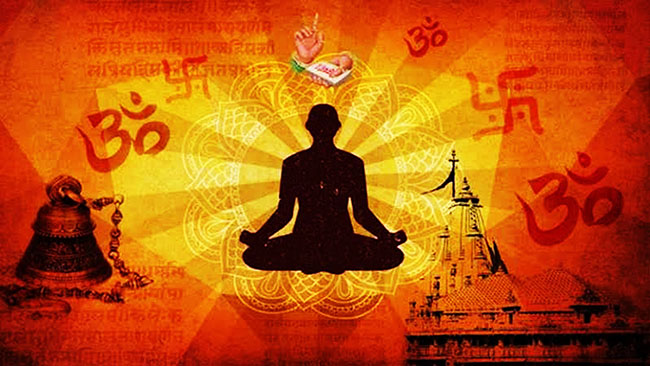Among all life forms which are known to present day humanity, the human life form is assumed as qualitatively the most evolved one and endowed with the potential to evolve to the highest level of consciousness. That’s why the aforementioned assumption may be validated only by the quality of our consciousness and the conscience. And, our character alone mirrors it best. So, shouldn’t the most evolved life form come across as the most responsible life form? Shouldn’t we uphold the responsibility of living our life in such a way (lifestyle) that all life forms feel protected and no life form is harmed unnecessarily in pursuit of enhancing our creature comfort? That is what we call Hindu way of living or Sanatan Dharma. ‘Hunger for ever enhancing comfortability’ is not synonymous with ‘Ease of living’. Though knowing the difference between the two is subtle yet, it keeps becoming perceivable and realisable to you when you live your life in the spirit of a yogi. And if you don’t then your wisdom is blurred. Your ‘journey-within’ is the journey of transcending animal nature and attaining divine nature till you know (realise) yourself as an eternal soul (consciousness). And, when you realise that then, all that you will do in this life span will be done through you to fulfil your responsibilities. And, in the course of doing that you will keep realising your real relationship with all that is there. In yogic parlance this is known as expansion of the self (udaar charitrya). In this limited duration in which you are in this human frame can you do any better than fulfilling responsibilities (in the ultimate sense of the word- responsibility)!
As individuals we all have Fundamental Rights and Fundamental Duties. But, does our attitude remain the same in both situations namely when we demand our rights and when we fulfil our duties?
Responsibilities are of various types. For example, some responsibilities you receive by birth. Then, there are contractual responsibilities which are based on your accepting them and consenting mutually on the basis of one or the other kind of contract. While some responsibilities come your way by way of election. And, for carrying out some responsibilities you are selected also. The purpose of putting all these examples of responsibilities is to bring you on the same page where you agree with me on this eternal principle that responsibilities are all around us and, our total immersion in fulfilling responsibilities alone may fill human life fully with meaning and purpose.
There are such responsibilities too for which we are chosen by destiny. And these responsibilities we assume voluntarily as fulfilment of destiny is the prerogative of volunteers. Assuming the responsibility of establishing eternal values across the globe is one such responsibility which Indic wisdom (Bharatiya-tva) accepts voluntarily. Destiny played its part by choosing Bharat as the originating point of Sanatan Mulya (eternal values) that’s why along with describing these as eternal values (Sanatan Mulya ) we may call these as Bharatiya Mulya or Maan-bindu also. No other civilisation, culture or knowledge tradition considers everyone essentially as eternal soul. That’s how it’s our destiny. Anyone’s identification with ‘eternal values’ transforms that one into a volunteer. ‘We’ alone are continuous unbroken civilisation (akhand sanskriti) because ‘we’ alone see ourselves as eternal souls. Our entry into this ‘we-family’ is voluntary and open to all and, at all times eternally. Entry and exit both are voluntary here. No judges here, none. Because the perception of ‘otherness’ dissolves in reality.
In any other thought tradition, ‘universal values’ are put across as the undisputed indicators to measure the validity of any narrative that is floated in the global arena for galvanising popular support in its favour. But, irrespective of the narrative for which it commits to galvanise popular support, it creates a binary of ‘us and them’. And, this is the limitation of this lens. The division reflects in every narrative floated. The lens made of ‘Universal Values’ always mirrors the division as a given fact. For example, let us examine the narrative of Human Rights. While seeing from the lens of ‘universal values’ we see that, as individuals we all have Fundamental Rights (adhikaar) and Fundamental Duties ( kartavya). But, does our attitude remain the same in both situations namely when we demand our rights and when we fulfil our duties? No, it doesn’t. The gaze/lens of ‘universal values’ speaks and listens only in binaries, else you are gagged and cancelled/muted. That’s why very few advocate such basic truths: if each one fulfils duties, will there be anyone left to’demand’ rights?
In Sanatan Parampara (Indic knowledge traditions) we don’t begin with division but with unity. And, one asserts such simple truths that if every human being fulfils one’s responsibility, there will not be anyone left to demand rights or question anyone else’s duty. In Indic tradition until our vivek (sense of discernment or judgement) transcends all divisions, we keep seeing our ‘incapacity’ to see essential unity beyond all divisions. This ‘incapacity’ we overcome by seeing ourselves through the lens of ‘eternal values’. For example, when we place the lens of ‘eternal values’, things which appear as ‘rights’ and ‘duties’ in other thought traditions, through our lens, the same thing appears as a single thing called responsibility. The word responsibility accommodates both namely, rights as well as duties as one and the same thing. This kind of unity may be visualised akin to seed and diversity may be seen akin to the flowering state of the tree. In the process of carrying out our responsibilities, rights and duties both get fulfilled without protruding as two separate prongs. It is easier for human beings to imbibe ‘eternal values’ in their character, leading to ease of living for one and all. Assuming our real responsibilities asks for renouncing creature comfort.
(To be concluded)




















Comments